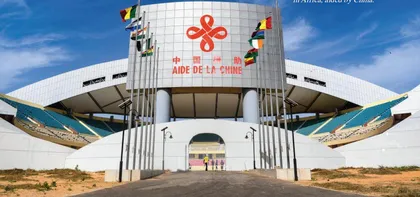Global Development Initiative and Building a China-Africa Shared Future of Development
作者: Zhang Chun

Against the backdrop of combined impacts of profound changes and global pandemic both unseen in a century, President Xi Jinping put forward the Global Development Initiative (GDI) at the General Debate of the 76th Session of the United Nations (UN) General Assembly, calling on the international community to re-focus on the development issue, to re-commit to sustainable development goals, to revitalize global partnerships, and to reset international development cooperation. The GDI is not only another important public good provided by China to the international community, but also stands for China’s flagship project that plays a leading role in global development domain, having important bearing on practicing the concept of leaving no one behind and constructing a China-Africa Community of Development with a Shared Future.
AFRICAN DEVELOPMENT PREDICAMENT IN WORLD’S NEW TURBULENT TRANSFORMATION PERIOD
Since the global commodity crash in 2014, Africa has entered into a new development low-tide period, which may last for a considerably long time: on the one hand, the Africa rising lasting for nearly two decades has gradually faded and terminated by the COVID-19 pandemic, and on the other, support for African development by the international community, drastically waned.
In regard to internal drivers, Africa’s sustainable development has encountered a major setback after twenty years of sustained rapid development between 1994 and 2014. On the one hand, its medium and long-term sustained economic development profile is less than optimistic. A review of the process of African economic development after the Cold War ended shows that though African economy witnessed marked development between 1995 and 1996, Africa rising to a large degree concentrated between 2000 and 2014. Since 2014, African economy has been impacted by the commodities crash, the China-U.S. trade friction, and the COVID-19 pandemic. Worse, impacted by the pandemic, African economy saw the first negative growth in half a century, by -2.1 percent in 2020. In 2021, African economy recovered with a 4 percent growth. The international Monetary Fund (IMF) forecasts African growth to be only 3.7 percent in 2022. The African Development Bank believes that it is unlikely for Africa’s annual growth rate to recover to more than 4 percent.
On the other hand, macro economic environment of African development has deteriorated dramatically, shortfall of fund continuing to gape. Since 2014, as increasing risks of balance of payments and fast mounting debt risks piled on, it has become impossible for Africa’s macro economic environment to improve in the short run. In 2014, there were debt risks in thirty of the African countries, among which 11 were low risk countries, 14 were medium risk countries, and only 5 were high risk countries; whereas by 2020, 38 countries faced debt risks, and among them one was low risk country, 16 were medium risk countries, and 15 were high risk countries, on top of which 6 countries had already fallen into debt crisis.
In regard to external support, there has been a remarkable downward slide in developed countries’ support for African development since 2014. After the global financial crisis of 2008, African development assistance from member countries of the OECD Development Assistance Committee (DAC) had kept growing, but turned to decrease since 2014, and not recovered to the level of 2013 until 2019 (regardless of inflation). With the pandemic outbreak, the OECD DAC’s assistance to Africa saw little increase in 2020, by proportion the share in its global total in fact being on a downward slide (See Figure 1).
There is hypocrisy in developed countries’ assistance to Africa. On the one hand, comparing the global financial crisis of 2008 with the COVID-19 pandemic crisis, one can see that developed countries have largely reduced their contributions to international development cooperation. The most important differentiation between the two crises lies in the fact that the global financial crisis of 2008 was induced by the West, and the subject of salvage was the West, be it internal rescue or foreign assistance; whereas the COVID-19 pandemic belonged to force majeure, and foreign assistance was not internal rescue. Therefore, in 2008 the OECD DAC countries provided a very large amount of foreign assistance, whereas except a small number of countries, in face of the COVID-19 pandemic, there was an evident downward slide in foreign assistance from most of the OECD DAC countries (See Figure 2).
On the other hand, developed countries locked down vaccines through agreement, exacerbating the already serious challenge of immunization gap to Africa. According to the figure of the United Nations Children's Fund (UNICEF), by March 2022, the AU had only locked down 486 million doses of vaccines for the whole Africa, much less than countries like Japan or the UK (See Figure 3).
GDI HAS IMPORTANT BEARINGS ON AFRICAN DEVELOPMENT
The GDI was put forward against the background of the UN 2030 Agenda for Sustainable Development undergoing not only undue implementation but also impact of the COVID-19 pandemic, and has particular important bearings on the African region in faces of serious development difficulties. Intended to effectively dovetail the FOCAC Dakar Action Plan (2022-2024), the China-Africa Cooperation Vision 2035, the AU Agenda 2063, and the UN 2030 Agenda for Sustainable Development, the GDI can provide stronger dynamics for economic recovery to Africa, promote achievement of sustainable development goals in Africa, and advance the construction of a China-Africa community of development with a shared future.